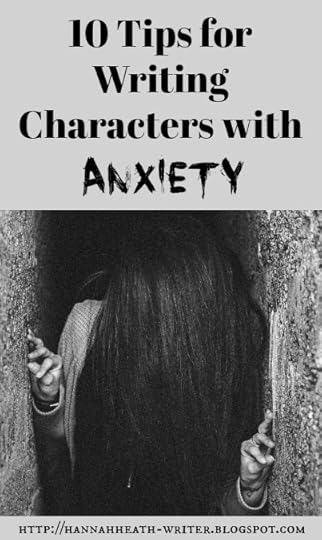Ah. I see you are writing a character with anxiety. Or at least thinking about it, since you clicked to read this article. Or perhaps you were just curious. Either way, welcome.
If you are, indeed, writing a character with anxiety, allow me to let you in on a little secret: You’re probably doing it wrong.
Now, don’t panic! You’re probably making very normal mistakes. Writers tend to stereotype characters with anxiety or get the symptoms wrong. Thankfully, these are all pretty easy to fix. Here are 8 tips for creating a character with anxiety:
 1. Know what anxiety is.
1. Know what anxiety is. Anxiety is not just stress. It is not just nervousness. It is an almost innate unease and/or panic brought on by any number of events, sounds, or surroundings. There are different levels: From an inability to think clearly to full-on panic attacks. It looks different for everybody, so there isn’t really a cookie cuter "anxiety" label that you can slap onto your character. Yeah, I know that makes things harder for you. So sad.
2. Understand that anxiety is not a defining characteristic. So your character has anxiety? Well, that’s not fun for them. But that doesn’t mean that they have no other personality traits. Your character is allowed to enjoy working out. She’s allowed to enjoy college studies. He’s allowed to like cooking. They can and should have interested and defining character arcs that go beyond simply having anxiety. You don’t write anxiety and make it a character. You make a character, develop them fully with likes and dislikes and backstories, then give them anxiety. This rule applies to writing
socially awkward characters,
depressed characters,
characters with chronic illness, and more.
3. Understand that anyone can have anxiety. Both your introverted and extroverted characters can have anxiety. Any of your characters can: Kings, cat ladies, professors, soldiers, children, athletes, thieves, punk biker dudes (somebody please do this), business executives. Anyone. It is true that some personality types may be less prone to anxiety, so don't shoehorn it in. But while you shouldn’t randomly slap anxiety onto any character that comes along, you shouldn’t be afraid of giving anxiety to a character-type who wouldn’t traditionally be expected to anxious. In fact, that could be a good interest point.
4. Choose the level of anxiety. Is it a mild issue? Or one that can be debilitating (such as an anxiety disorder)? Or is it one that’s usually mild, but can be pushed over the edge during certain events? Choose the one that makes the most sense for your storyline. For instance, a detective with anxiety could feel tense and wired at a crime scene, but it wouldn’t make sense for him/her to have a massive panic attack each time they go to work.
5. Pick the symptoms. Everyone reacts to anxiety differently. Keeping your character’s level of anxiety in mind, choose some symptoms. Here are a few, but there are many more:
Brain fogTremblingInability to focus or make decisionsShortness of breath Self-conciousness Immediately going to worst-case-scenarios in stressful situations Getting extremely quiet or extremely loud (depending on the personality) Fatigue. Because clearly, being anxious is a full-time and rather exhausting occupation. Trouble sleeping Sound sensitivity Racing mind/always feeling wired Muscle tensionIrrational fears
6. Decide why they have anxiety. Your character may have developed anxiety because they have a stressful life and were not given the tools to deal with it correctly. Or he may have always had anxiety for no definable reason because anxiety doesn’t always make sense. Maybe she only experiences anxiety in specific situations because of past negative experiences.
7. Decide when their anxiety comes on (or is at it's worst): Maybe random things set him/her off, such as: Loud noises, being alone, being in a crowd, heights, speed, etc. Or maybe they're just in a constant state of slow-burning anxiety. Maybe only very specific events trigger panic attacks. You get to decide. But try to make it make sense to the character and the plot. Extraneous details that don’t add to the character or the storyline serve no point and should be discarded.
8. Do your research. If you don't have anxiety, yes, you absolutely can write a character with anxiety. If you're having trouble understanding his/her mindset, don't give up. Nobody likes a quitter. Just do some research. Either online or by talking to people who do have anxiety.
9. Take breaks while writing. If you are writing a character with high levels of anxiety (especially if you're writing from a deep POV), then this is especially important. Writing panic attack scenes or just a very anxious character can (and often does) give writers second-hand anxiety. So don't forget to get up every once in a while. Drink some tea. Go for a walk. Don't panic. Do you hear me? Don't. Panic.

Note: In this gif scenario you are Ariel and I am a less-musically-talented version of Sebastian. Also: I don't have a Jamaican accent. So, basically, the only thing Sebastian and I have in common is that we're always vaguely annoyed with everything. And you probably don't have much in common with Arial because I assume you're not dumb enough to sell your voice to a witch to meet a random dude with good hair. *sigh* This was a terrible gif usage. I'm sorry. Moving on.
10. Remember that anxiety has to be the focal point of the story. I see a lot of books where the focus of the book is a character overcoming anxiety. It’s almost always a contemporary YA novel. Unfortunately, you cannot write a character with anxiety in any other genre. My fantasy novel has one, but shouldn’t because we all know you can’t be an assassin with anxiety. Your murder mystery novel can’t have one, because detectives can’t have panic attacks. Aliens don't have anxiety, so you can’t use this character trait in sci-fi. Even if it fits into the story, adds to a character, or will help your readers, you cannot give a character anxiety and not make it the point about which the entire story revolves. It simply isn’t done. Sorry.
Got it? Okay. Now get back there and start write a character with anxiety! Calmly. And rationally.
Have questions or tips of your own? Please share them below! Also: Who is your favorite fictional character that struggles with anxiety? I must know.
Have writing or reading questions? Use the hashtag #ChatWithHannah and have them answered on my Youtube channel! Related articles:
Writing Introverted Characters: 8 Things You Should Know8 Different Kinds of Strength to Give Your CharactersWriting Characters with Depression: What You're Doing WrongEnjoy this post? Take a look around. If you like what you see, don't forget to subscribe by email for a new post every Friday!
 newest »
newest »
 newest »
newest »
 Hello! This is a great point. I can see this being a very good (though tough) backstory for a character to help give readers a better idea of the types of things that can cause anxiety. Thank you for sharing!
Hello! This is a great point. I can see this being a very good (though tough) backstory for a character to help give readers a better idea of the types of things that can cause anxiety. Thank you for sharing!  Daley wrote: "Too many people equate butterflies in the stomach over saying something dumb to your crush, or sweaty palms at the thought of failing a math test, with REAL anxiety. Thank you so much for your brav..."
Daley wrote: "Too many people equate butterflies in the stomach over saying something dumb to your crush, or sweaty palms at the thought of failing a math test, with REAL anxiety. Thank you so much for your brav..."






Also PTSD can be a source of severe anxiety whether it's from war or from an event (or repeated event) in the life of a person that caused them a great deal of stress. The nature of the event along with the disposition of the person can determine how great future anxiety is in nature and in scope.
Another form of anxiety is also found when someone is going through existential crises or someone whose belief system isn't solid. The cognitive dissonance can cause major havoc on people mentally. In fact, any kind of cognitive dissonance can cause anxiety.
Also, Hannah I think you made a typo on #10 In that you say anxiety MUST be the focal point of the story in the title. I think you mean" It does not have to be"?